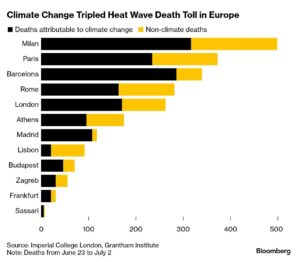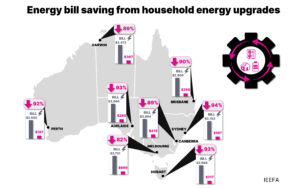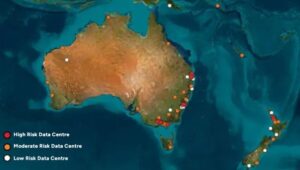Climate change triples death rate, Auckland 67th riskiest and kale getting KO’d
In this issue:
Climate change triples death rate in Europe
65% of heat related deaths in Europe can be attributed to climate change according to an analysis by researchers at Imperial College. They looked at death rates across 12 European cities during the 23rd June to 2nd July heatwave. Of the 2,300 heat related deaths, they attribute 1,500 directly to the incremental impact of climate change. 88% of the deaths were of people over the age of 65.
Efficiency at home – the real answer to energy hardship
Yet more evidence emerged this week that combatting energy hardship is not all about prices. It often seems overlooked that there is more than one contributor to high electricity bills and use is at least as important as price. In fact, according to the analysis of household bills in Australia by the Institute for Energy Economics and Financial Analysis (IEEFA), use is far more important than price when it comes to the overall cost. It’s analysis indicates a programme of household energy upgrades could slash typical household bills by 82%-94% across Australia, and that’s after consideration of the price drops Australia has already seen because of the proliferation of residential solar. Of course, residential efficiency also contributes to energy security and the move to 100% renewables by reducing stress on gas supplies.
Data centres at risk
We’d probably get quite frightened if we thought seriously about our reliance on data centres, so it’s worth understanding the risks they face from climate change. XDI Systems has analysed the risks facing 9,000 operational and proposed centres around the world, grouped into geographic hubs. The risks mainly relate to extreme weather events and insurance availability and cost. The highest risk hubs are, in order: Jiangsu (China), Uttar Pradesh (India), Hamburg (Germany), Shanghai (China) and Moskva (Russia). Tokyo, Bangkok and Hong Kong also appear in the top 10, with a cluster of US hubs in the 11-14 rankings. The riskiest hub closer to home is Queensland, which ranked 16th. Auckland is the only NZ city listed in the top 100, coming in at 67th riskiest.
Emissions targets still lacking integrity
This year’s Corporate Climate Responsibility Monitor by the New Climate Institute informs us none of the 55 major, international brands analysed achieved the classification of “high” or even “reasonable” integrity for their emissions reduction targets. Leading the pack with “moderate” integrity are H&M, Inditex and Stellantis, while bringing up the rear with the classification of “very low” are the household brands PepsiCo, Shein and Toyota along with meat company JBS.
Kale losing its nutrients
We’ve run numerous stories in this forum about how climate change will impact the risks to crops and crop yields. It turns out, it will also impact quality. Scientists from Liverpool John Moores University have uncovered that high atmospheric levels of CO2, along with higher temperatures, impacts the nutritional quality of crops, especially leafy greens like kale and spinach.
Did you know …..
The world is likely to see increased frequency and severity of volcanic eruptions because of climate change? It seems as glaciers melt, pressures constraining magma are lessened, which will result in more activity. While this latest study is based on research in Chile, it supports previous research carrying similar findings from work in Antarctica.





